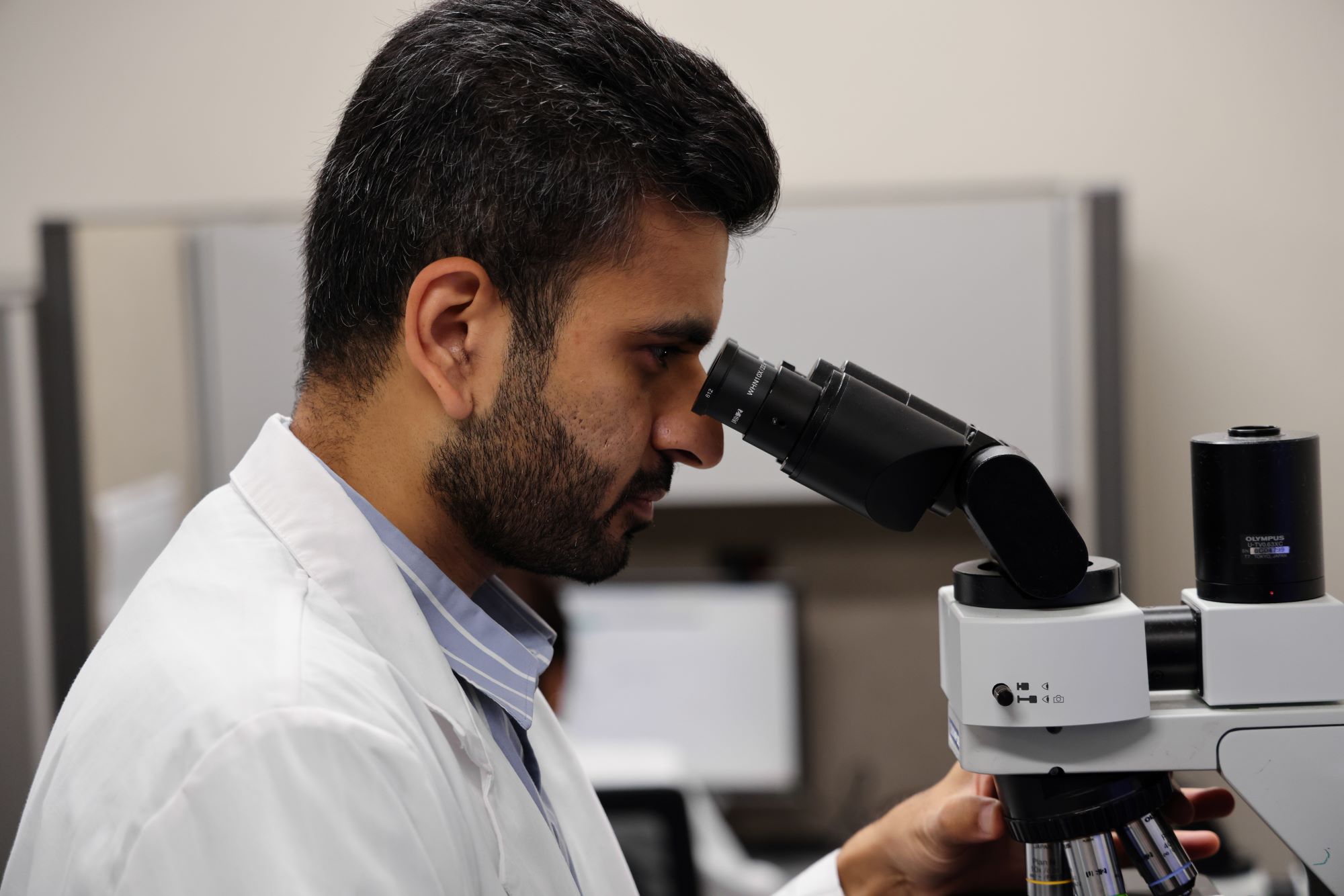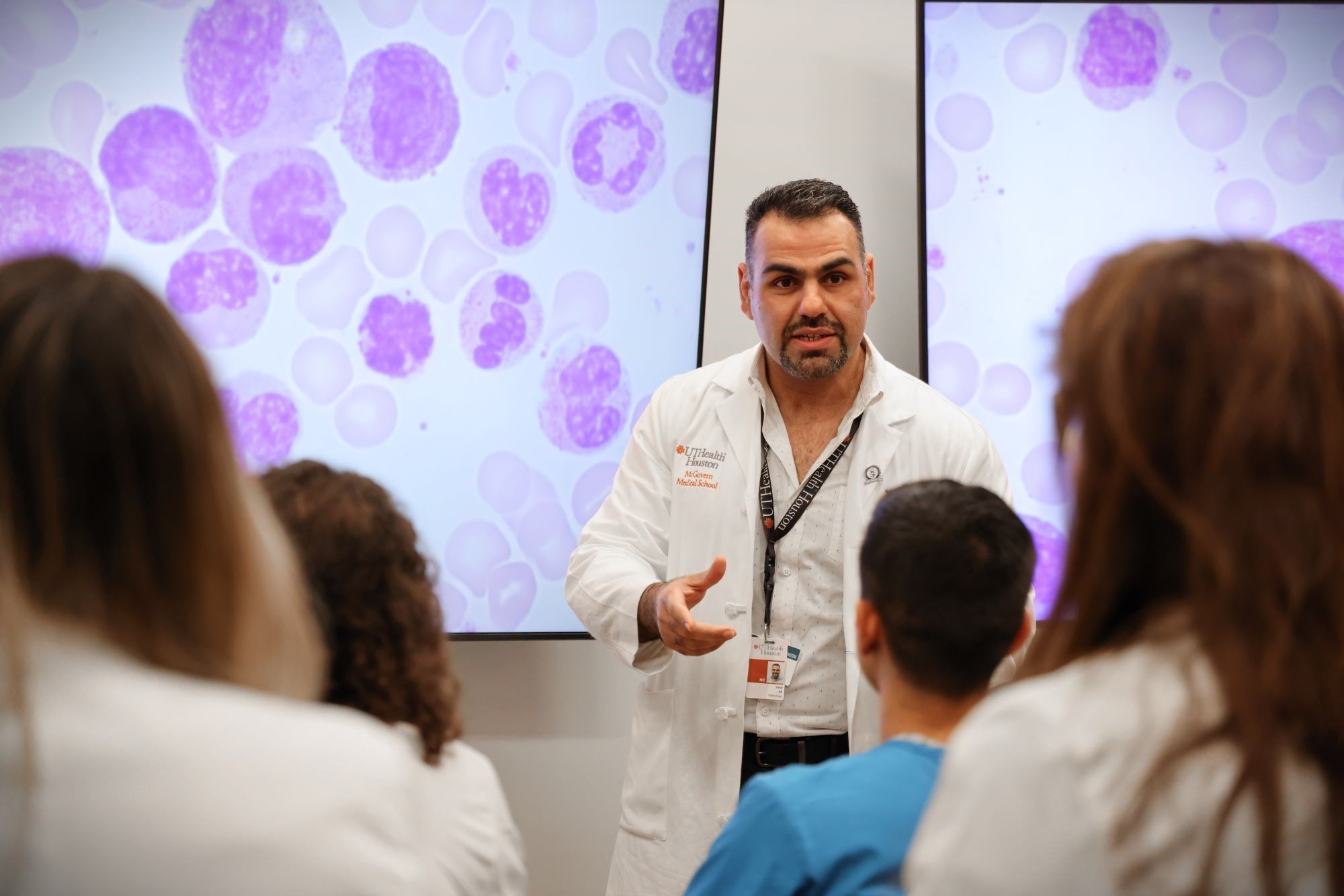Curriculum
Residency rotations in the Texas Medical Center (TMC) provide residents with exposure to varied practice settings and patient populations across multiple institutions. Senior residents enjoy flexible schedules and can choose from a diverse array of electives.
Career Focus Track:
- The Career Focus Track (CFT) is an innovative program that allows residents to concentrate on a specific area of pathology in which they plan to pursue further training, or in which they would like to gain additional exposure.
- Residents who elect into the CFT enroll in 3-4 consecutive blocks of the specialty they are focused on. They are paired with lower-level residents, allowing them to focus on learning at a fellowship level of performance with the opportunity to directly teach and mentor junior level colleagues. This tailored approach to resident education allows residents to enter fellowship with a higher level of knowledge and confidence.

Core Curriculum:
- Rotations are 4 weeks in length, totaling 52 blocks over a four year residency. First-year residents typically complete:
- 5-6 blocks of surgical pathology
- 2 blocks of autopsy
- 1-2 blocks of blood bank
- 1-2 blocks of hematopathology
- Remaining blocks are divided between Anatomic Pathology (AP) and Clinical Pathology (CP).

Core Rotations:
- Residents rotate at Memorial Hermann Hospital (MHH) and Lyndon B. Johnson General Hospital (LBJ). MHH has sub-specialty sign-out while LBJ has general sign-out, ensuring a comprehensive educational experience. Additional core rotations include pediatric pathology, renal pathology, soft tissue, neuropathology, and dermatopathology. Annually, these hospitals accession approximately 32,000 specimens.
- Training in cytopathology occurs at both MHH and LBJ. In addition to sign-out of all types of benign and malignant cytologic preparations, residents also assist in rapid assessments. Together, MHH and LBJ review approximately 26,000 cytology specimens annually.
- Residents gain experience in medicolegal investigation and forensic pathology at the Harris County Institute of Forensic Sciences. All aspects of death investigation including scene analysis, autopsy procedures, and laboratory evaluations are covered.
- Residents dedicate 3-4 blocks to autopsy, performing hospital autopsies for MHH and LBJ. There are approximately 150 autopsies completed yearly.
- Training includes interpreting bone marrow and lymph node biopsies, flow cytometry, peripheral blood and body fluid smears, and CBCs. Core training takes place at MHH and LBJ with approximately 600 bone marrow biopsies and 1,200 flow cytometry cases yearly. The LBJ rotation also offers experience in clinical laboratory management.
- Residents interpret antibody panels, manage transfusion reactions, investigate compatibility issues, and monitor component usage. They also participate in therapeutic plasmapheresis, RBC exchanges, and photopheresis. The rotation also includes observing collection, preparation, and storage of blood products at Gulf Coast Regional Blood Center.
- Residents spend mornings in the chemistry lab with didactic lectures. Afternoons are spent on coagulation and immunology sign-out with gel interpretation and reporting.
- Training includes microbiology laboratory bench work and rounds with infectious disease specialists. A weekly joint didactic conference with LBJ clinical pathology residents is also part of the curriculum.
- Residents study molecular diagnostics and cytogenetics at both the UT Houston Department of Pathology and M.D. Anderson Cancer Center (MDACC).
Elective Rotations:
- 4-5 blocks of electives are available and may be taken in any combination of AP and CP or used for research.
- Electives are offered at MHH, MDACC, and Houston Methodist Hospital, as well as other institutions in and around the TMC.
- Residents focus on areas of interest or gain subspecialty training.
Conferences:
- Residents have daily protected conference attendance times along with an abundance of additional slide and multi-disciplinary conferences to supplement resident education.
- Residents obtain teaching experience through presentations at interdepartmental conferences. These include multidisciplinary conferences, tumor boards, and subspecialty conferences.
- First-year residents attend pathology boot camp during their first two blocks, providing a foundational knowledge in histology and pathology.
Call:
- First year residents cover daytime weekend CP call while second year residents and above cover AP call along with CP night call. Call is covered from home.
- While on call residents work closely with pathology faculty and staff to ensure optimal patient care.